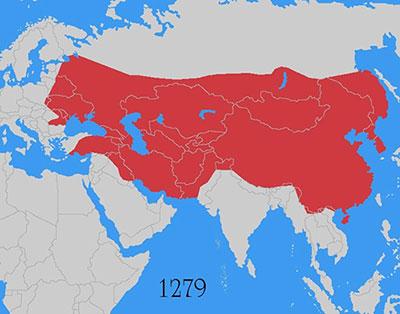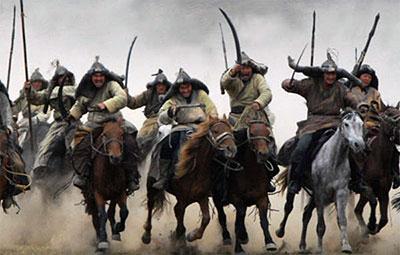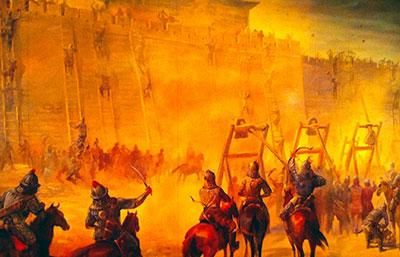Mongolia
Genghis Khan: barbarian or hero?
Jan 05 2016
Often depicted as a barbarian and a bloodthirsty leader, creating an empire accross Eurasian continent and damaging cities on his way, Genghis Khan was it that real barbarian or the leader that united a country and dressed the basis of the modern society as early as the 13th century?
Today historical data can explain what was real and what was not in this matter, so let's start!
For a better understanding, let's write the good things about Genghis Khan in green, while the more critical ones (considered as bad) will be in red.
So everyone knows Genghis Khan, the great leader of the 13th century that created an empire to the cost of millions of lifes, and left ruins of cities on his way.
Maybe, but let's not forget that he was one of the greatest leaders of all time. Born under the name of Temujin, he was an orphan, and left without any ressource, he made his way out to unite the clans of what is now Mongolia, and ultimately to create the biggest empire on earth! Spreading from the Pacific ocean, up to the heart of Europe.




------------
It is said, that because of his invasions, the North of China lost about the 2/3 of its population! It is also known that under the ruling of the Jin dynasty, all the northern tribes were under influence of the Chinese, even been paid to kill each other, and the Jin were actually attacking them at some points. About the population decrease, it can also be explained by a bad management of counting people, and that a great part of the farmers at that moment voluntarily engaged themselves into the army of Genghis Khan, decreasing de-facto the statistics of the population taken into account.------------
Armies of Genghis Khan burned down cities, massacred their inhabitants and created chaos on the surroundings. Genghis Khan actually preferred that his enemies surrender and pay a tax to be protected then, and believed into loyalty and diplomatic laws. Those cities which have been destroyed were the results of rebellions against the Khan after having been surrendered to him, or if they killed the Mongolian ambassadors sent to negotiate.
------------
Historical reports stated the Mongolian army of the Khan was far more brutal than expected: some were ripping the children out of their mothers belly, use prisoners as human shields or fill the moats with human prisoners in order to support the weight of the siege weapons into gaining control of the enemy castle. As barbarian as it sounds, it may be true. But is it more terrible that all the inventions and atrocities made during the middle age time? It does not excuse these methods, but tend to depict the Khan as a tactitian of his time. We cannot deny the great changes made for the good of people under his influence : by uniting the tribes, the tradition of kidnapping women has been abolished. Also, mongolian women have been given a more important role in society, creating new rights especially for them, like taking part of important decisions, have the responsability of homes, divorce as an option for married couples... Temujin would remain with his first wife all his life, and raising his illegitimate son as his own.------------
His conquests contributed to the loss of 40 millions of people accross Europe, well after his own death. It is about 10% of the world known population at that time! This, is without counting the damages caused by the black plague, introduced by the Golden Horde into Europe, when they laid the siege of Kaffa in 1345. You have to understand also, that those historical documents have been written about 100 years after the actual events, not 100% accurate or to be trusted. Mongolians, in fact at the siege of Kaffa didn't introduce the great black plague to the city by throwing their dead bodies inside, but by indirectly bringing the disease with them unnoticed, carried by animals such rats. Modern medicine states in fact people who got infected could not infect other people. Interesting note: from the people who survived the Mongolian attacks were integrated to the new Empire, and many benefited from the change. Mongolian Empire was tolerant with different religious practices, people were treated as equal, and by their work, or enlisted as a soldier of the State, it was possible to get a better position in life. Some more developed systems appeared with the Mongolian conquests such like the unified postal system, universal justice, and a mix of cultures of the countries.
------------
Bagdad was part of the dark history under the Empire. Cultural capital city at the period, Bagdad has been destroyed by the attacks of Hulagu Khan, as well as great libraries, hospitals and palace burned down... Unlucky Bagdad was, its Caliph actually refused to surrender the city. Hulagu Khan was then punished later for this by Berke Khan. Generally speaking, Mongolian Empire was avoiding those sorts of practice, saving doctors, literate people, and craftsmen in every surrendered locations. They would be used then for the Empire, and spreading new knowledge as a result.------------
What to say about the complete destruction of the Kievan Rus', when the Mongolian invasion raced towards Ukraine in 1240? This action took place at the golden age of the Kevian State, and thus pushing it backwards into the middle age time while the rest of Europe was flourishing into the Renaissance. You have to know that West Europe was not any better, nor a quiet and peaceful place to be. Mongolian invasions allowed prosperity on new roads, like the famous Silk road towards West, allowing commercial routes and exchange of culture. Russia and China unified as states as we know them now, benefited actually from the Empire of the Mongols. Genghis Khan left his inheritors be part of the noble casts that were the decision maker well after his death, creating both stability and flourishing periods for the conquered lands.------------
And you, reader of this article, might even be related somehow to the great Khan himself! A study revealed that around 16 million men are sharing the same genes of Genghis Khan today, that is to say, about 1 men out of 200 ! Does the historical accomplishments of a leader can overpower the losses caused by such a rise? So let us know what you think about this article, all comments are most welcomed!Archives
Tags
Tourism (35)Culture and Tradition (26)Tips and Tricks (20)History (8)Flora and Fauna (5)People and Ethnicities (5)mongolia (4)adventure (3)explore (3)festivals (3)going to mongolia (3)Gastronomy (2)Languages (2)News (2)Religion (2)things to do (2)airlines (1)altai (1)dukhans (1)eagles (1)kazakh (1)naadam (1)reindeer (1)shamanism (1)shamans (1)Society (1)taiga (1)tsatsaans (1)

